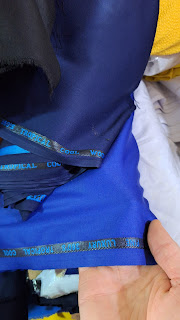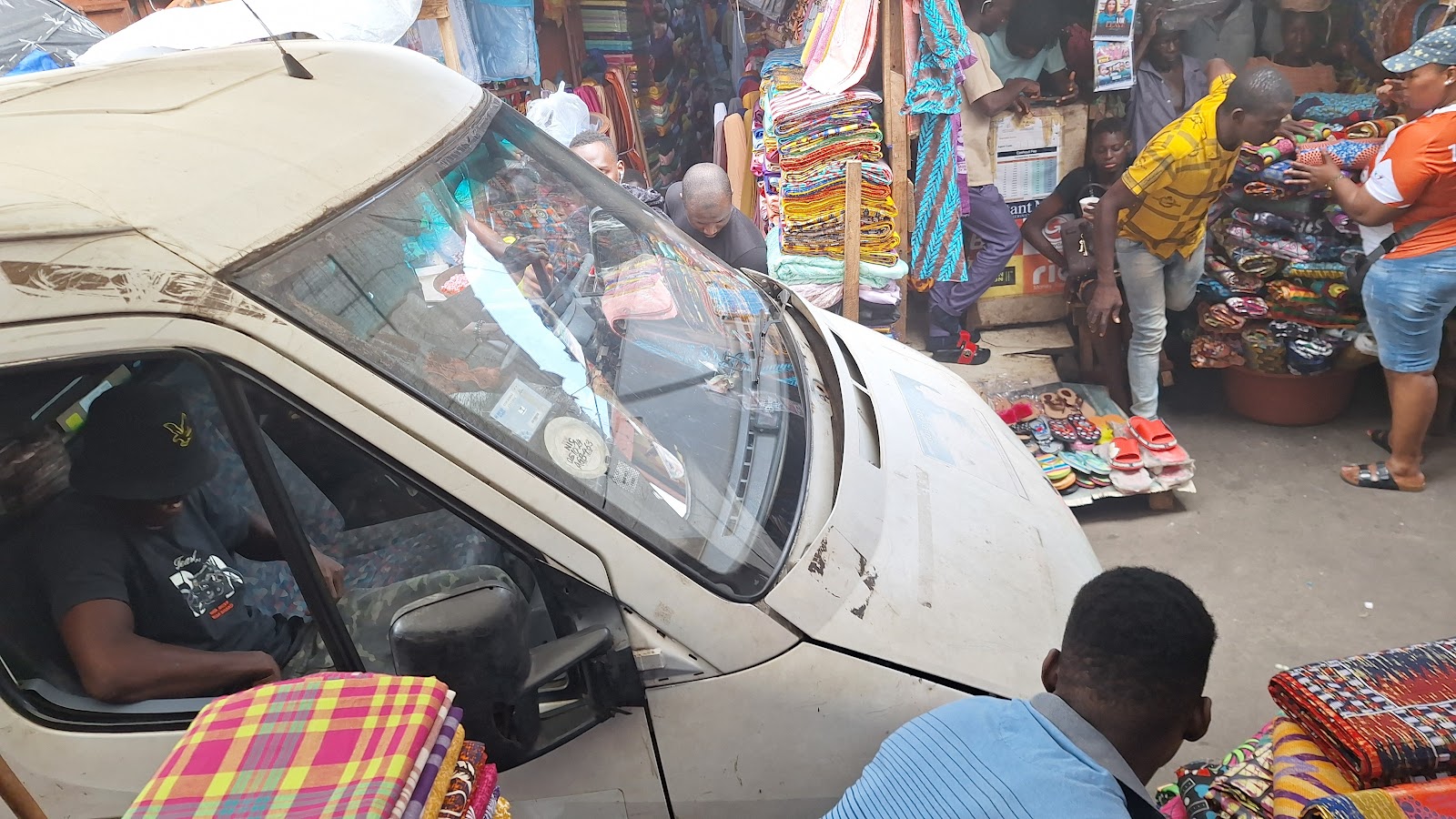Disclaimer: if you're afraid of run-on sentences then this may not be the post for you.
Saturday.
Saturday is hard to describe. So, with that, I'll attempt to describe it.
Breakfast: normal breakfast of coffee, eggs, and yogurt. From there, met Sallymae, my co-volunteer, at 10am at the dock for a keke ride (three-wheeled taxi...somewhere between a covered motorcycle and small car). We were headed to the fabric markets. She had Whatsapp'ed a driver who said he'd be there but it was clearly not the same person. The driver we expected had been robbed last week and we were supposed to be in a white keke and this was quite a colorful one. Odd, but okay. Let's move on.
Then we negotiated a rate and off we went into the hot, smelly roads of Freetown. About 30 minutes to go what would have been 5-6 minutes with no traffic and he dropped us off. Then we hiked because he dropped us off at the wrong end of Malama Thomas Rd. As we walked through the fabric market I looked over and the lady I typically buy fabric from waved at me. I promised her I'd come back. I've been to her store several times before and always brought friends.
We were looking for a specific store—one with large bolts of fabric—because we needed to buy enough for the team (typically 3 to 5 yards per person). We went to where we thought we should have been, and it looked wrong. But we searched anyway. I bought some hot chili peppers as I was looking at another stall where they were cutting up chickens. Another lady tried to sell me an avocado. I said no.
We then found the place we thought it was supposed to be. The owner is Isatu. Here she is and her shop.
I still don't think we found the right person, but se la vie. We found some beautiful fabrics. We negotiated but she remained firm so we decided to leave. Then she began budging. Aha, okay. Good to know. We said we would come back even though I wasn't sure we would.
 |
 |
As we walked back to the first shop, a van tried to drive by in this narrow street, filling the air with all sorts of pollution (it was bad). And it was stuck. It could not move through so all store owners had to pull their things away from the van to let it go by and it knocked over items along the way. It eventually passed after several minutes.
I warned you about run-on sentences.
We eventually bought the fabrics after negotiations and getting Isatu down a little bit. But success! So we headed to Crown Bakery for water, a beef shawarma wrap, and then to get a keke home. Little did I know that would be more exciting.
After leaving a delightful lunch with my friend Sallymae, we headed back. We found a keke who was the most aggressive driver I've yet had (and that is saying something). he went around all sorts of vehicles, up hills, and went 70 kph in the three-wheeled keke. I should add, there are no seatbelts, doors, airbags, or much in the way of structure to keep us safe should we blow a tire or hit a car. It would be a trip to the hospital. And even though we are a surgery ship, it's not trauma, so it would be to a local hospital. Ibrahim, our driver, quickly grew fond of me, realizing I'm an American and could help him.
When Sallymae and I hopped in, there was already a local Sierra Leonean passenger. Our driver kicked him out and told him to get another keke. This grieved us as this is typical that locals will get kicked out because foreigners bring more money and are "worth more". We are not the first, nor are we the last. It is very sad. It's something I try to avoid whenever possible but is something we are sensitive to — we want to help but often being the foreigner gets in the way and disrupts the local economy in more ways than we can see.
As Ibrahim drove fast, he started saying he loved me. I wasn't sure if it was a language issue. Did he mean "love"? Did he mean something like "I like you"? Or, as I learned, he was more interested in trying to get a job from me because he realized I was a white person and white people pay well and always need locals. Ah, okay, I get it now. Again, this grieved me. It saddened me but I recognized the game I was in. Don't do anything dumb because he's racing through traffic and going 60-75 kph. Then he wanted my WhatsApp. Ah, it's becoming even clearer.
We eventually got dropped off by the ship, got his WhatsApp number, and then as we walked to the ship agreed that we don't want to do business with him. He's too loose. He wanted a loan to buy a keke, promising me that he will pay me back. he was also pretty reckless of a driver, unlike the first one who was quite defensive.
Whew! Back at the ship and it was only 2pm. I was going out that night to a play. So I rested, went to the gym, and then had an early dinner. Then back to the dock at 5pm.
The play was called Fantasia and would be at the Radisson Blu hotel in Freetown. I expected it to be dark and likely sad and potentially gruesome because it was about kush a local synthetic drug. Highly addicted and makes people into zombies. It's really destroyed many young men here. So much so that you can find short documentaries on YouTube (like this one). We left early because we were caravaning and we were unsure about traffic.
But not 10 minutes out of the gate and one of our vehicles in front of us gets in the right lane and completely fishtails around the road. Thankfully, they did not hit anyone and everyone was safe, but it was scary nonetheless. We got out, inspected the car. Everything seemed fine, except the rear tire was a bit low. A few people inspected it and it seemed fine. Then we got back in. While following them, it realized something was off. It wasn't good so we tried to radio them. Our radio stopped working — what luck. So then we honked, waved at them, and did everything for 30 seconds to get their attention. Finally, they looked saw us, and pulled over. From there, it was another ordeal to call back, relay what happened, and figure out next steps. A few people stayed behind in the car to get it taken back and the rest of us ventured on. It was yet another stressful moment but we were thankful there were no injuries or accidents. Land Cruisers can tip over easily, especially with how that one was behaving.
We get there 10 minutes before 6pm and then they said they were running behind and needed 30, no, 40 minutes. Great. We'll grab a drink, sit down in the hotel, and wait.
The play was great. Turns out, when the Spanish embassy runs a play called Fantasia, you shouldn't think of Disney and Mickey Mouse when you pronounce it. You should say it like it was a Spanish word: fahn-tuh-SEE-uh. Oh, that makes a lot more sense. And likely also helps any copyright issues.
It was about kush the drug but it was hilarious, provocative, and whimsical. Without giving away the story, it was a thoughtful curation about the inner life of someone stuck in the hole who uses kush as an escape from a dad who beats him relentlessly, has no hope, is told he's a failure, and doesn't believe he's worth anything. Ouch. When you start from zero and end at zero, what should we expect? There was only one hope: fantasy. But even that hope is no real hope. There's hope in Jesus, but not in our own escapes, in our own dungeons, in drugs, or even in forgiving ourselves.
It was great being out with fellow volunteers to get off the ship, explore Sierra Leone, and find and support a fledgling playactors group. There were 70 people and easily half were from Mercy Ships. They appreciated our coming out and supporting them. I appreciated what they were doing with trying to tell the story of kush and what impact it has here.
We went home. Thankfully, it was a safe and uneventful ride home. But it is days like this where you realize so little is in your control: whether it is trying to find a poorly marked fabric shop, seeing chickens getting cut up just a dozen feet from the fabric market, sticking out like a sore thumb, inhaling tons of fumes, being asked for money by many people, wild keke drivers, desperate keke drivers, or cars breaking down, it really does help remind me that very little in life is under our control. Life back home in America felt very controlled. This is the antithesis of that feeling. There's a wild beauty here. I love it. I find it amazing and yet exhausting. Coming back to the ship represents a western first world place where I have a bed, electricity, internet, raw vegetables that I can eat, cereal, clean bowls and plates, and my family. It's important not to make a dichotomy but to experience and see life and culture as something breathtakingly spectacular, and also fiercely wild and uncontrollable.
I can let my guard down on the ship. Okay, that is great, but this is not where I am called. I'm called to serve and love those around me, and while most of my job is on the ship, I am also here to participate and enjoy meeting people on land, to talk with Isatu and her daughter who is studying financial accounting, or to make friends with Alimamy who is one of our funniest day crew or Francis, another day crew, who is doing this because it pays well, but he wants to get back into accounting which is what he studied. How can I make a difference there? How can I help both of these men? Not in a white savior mentality. Perhaps it is staying out of their way. Perhaps it is helping them with connections. Or perhaps it is simply a smile, accepting a gift, and watching them obtain something far greater: their sense of worth and dignity.
These are some of the typical Saturdays. It is weird, wacky, and unpredictable. But it's not just what I do or what's done to me, but it is living in the ambiguity, in the grey. It is asking and being asked these questions. It is exhausting. But it is life-giving. Perhaps my role is finance, but is that it? Or could it be more?





